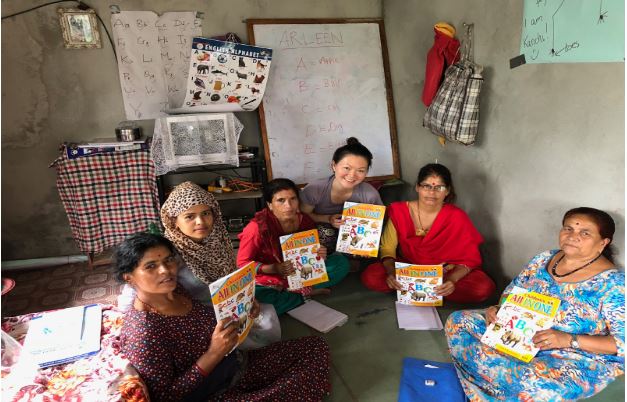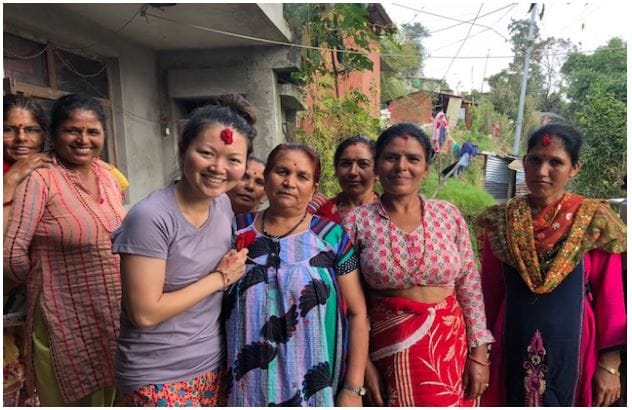BY :-Arleen Chong
In the rural area of Nepal, access to sanitary facility and water is a challenge. There are still communities where the women are carrying water to the house, bathing and laundering in the public. Additionally, for the women of Mudkhu Bhanjyang, literacy rate is still extremely low despite an increased rate of 17% to 57% from 1991 to 2015 nationwide. For the development of good health practices and promoting sanitary living condition, education is a key component in acquiring knowledge and creating social awareness for Women Empowerment . I have had the pleasure of meeting and working with the women of Mudkhu Bhanjyang, who always walk in with a smile and ready to learn.
Since we are working in a tight space and sharing each others supplies, I decided to start off with the simplest and most important habit we can cultivate, one that can dramatically prevent disease transmission and occurrence, by hand washing. We reviewed and discussed where germs can be found, how germs are transmitted, when to wash our hands, and practised proper hand washing technique. For the rest of the two weeks, we would start class with sanitizing our hands, thus, cultivating a habit.With my expertise as a pharmacist, I thought it would be beneficial to review medications available and taken by the local women. Improved understanding of medications has been shown to increase compliance leading to better treatment response and decreased side effects. I was informed there is a general practitioner who would come visit once weekly to manage minor ailments such as acid reflux, headache and body pain. Common medications dispensed include non-steroidal anti inflammatory, omeprazole, and antihistamine. I had asked the women to bring in their medications and would review the indication, dosage, occurrence of any side effects, potential drug-drug or drug-food-alcohol interactions, and recognizing failed treatment and management.

In Nepal, alcohol is perceived by some communities as a remedy for cold, pain, stress and fatigue. Alcohol is also an essential part for some of the major festivals, thus, creating a social culture that is more tolerant to alcohol use. In the rural areas, distilled homemade alcohol especially Raksi, is simple to make, ingredients are easily attainable and low in cost production. For all these reasons, alcohol abuse is prominent in the rural areas, and women particularly widow, separated or divorced women, were more likely to take alcohol. Additionally, the risk for alcohol related effects are also higher in women due to the fact that a woman’s body generally have less water, so the blood alcohol level is relatively higher in than a man who consumed the same amount of alcohol. Consequently, women are more susceptible to alcohol related heart disease, higher risk of development of brain damage and blackouts, as well as breast cancer. The legal drinking age in Nepal is 18 years old. However, there are many who were exposed and began alcohol consumption at an earlier age, which increases the risk for alcohol abuse later in life. Drinking is also more common among middle-aged and elderly women, and this is risky due to slower alcohol metabolism with increased age, thereby prolonging and amplifying the alcohol effects. Consumption of alcohol is not only a financial and health burden, but it also causes emotional and psychological conflict within the family. Low level or lack of education is a proven independent trigger of alcohol consumption, and studies have shown that the understanding on the effects of alcohol is limited by literacy status.
For the women at Mudkhu Bhanjyang and View Tower, it was an opportunity for me to share some insights on this issue. I would do an interactive two way discussion to access for any potential abuse of alcohol, the effects (if any) on themselves and the family, physiological damages to the brain, body and fetus if pregnant, and what they can do to help themselves and others. Some families are in denial about members who are alcoholic and suffering from drinking problems due to the shame and stigma it brings to the family. I hope, by instilling some knowledge with the women, it will encourage them to recognize and acknowledge there is a problem and thus come forth with the problem, to seek help and support each other who are also suffering from the same problem. To further empower them, I dedicated the second half of the class to teaching basic English and Mathematics. I had such a wonderful time seeing them so eager to learn addition and subtraction, which will come in handy on day to day activities. I enjoy hearing them laugh and it is so rewarding to see them teach each other on pronunciation and calculation. I will never forget the warmth, kindness, trust, respect, gratitude and genuinity they had shared with me.

The last project I assisted was to develop and educate the locals on the safe handling of chemicals for liquid soap making, and to research the safety of the ingredients utilized. Domestic soap production is a growing market and for the community of Jitpurphedi, the women are trained and aim to become entrepreneurs through the Income Generation Initiative via the Women Empowerment program. My host family and neighbour produces liquid soap for bathroom, floor, dishwasher and laundry cleaning. The chemicals used can cause injury if not handled, stored or used properly. Henceforth, I had developed some basic safety guidelines obtained from different sources including wearing appropriate protective equipment, storage and transport handling, and what to do in case of spills and splash exposures to eyes and body. I have also prepared some general information regarding the purposes and actions of the ingredients used.
I have been asked what I gained and experienced in this mere short two weeks. I love interacting with the local people as they are friendly, kind, humble, and has such joy and perseverance even in hard times. I found the local and international volunteers to be inspiring, motivating, talented and were so ready to support and provide encouragement to each other. I thoroughly enjoyed hearing the various languages and observed how diverse cultures handled certain challenges similarly or differently from what I was accustomed to. Immersing in the local culture and being a part of their daily lives and struggle has pushed me beyond my comfort zone and challenged my capabilities. It has been enriching in ways I would not have known had I not taken the step to go Nepal There is still much work to be done and through the resource and support from VIN and international community, I believe for every single women we teach, it will help empower them in small and large ways that we may not necessarily foresee, but it does matter.


 Member of
Member of